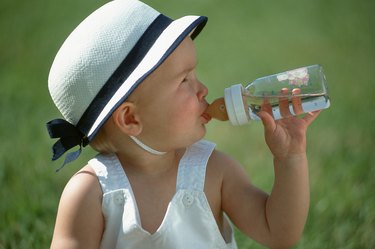
Most people think of water as a harmless drink essential for life. While it is for adults, this is not true for babies. When your baby eats and drinks it is on an as-needed basis only. The nutrients inside his body are in perfect balance. Giving him water before he actually needs it can offset this balance and cause harm.
Needs
Video of the Day
The needs of your growing baby can all be met by his intake of formula or breast milk. Water intake does not need to be a concern until your child begins to eat solid foods or until your pediatrician tells you it is appropriate. According to Dr. Alan Greene in his August 2009 article for the "New York Times," all hydration needs should be met through formula or breast milk, even when your baby just seems thirsty. However, if your child is eating solid foods and taking in at least 32 oz. of breast milk or formula and still seems thirsty, it may be safe to offer him between 2 to 4 oz. of water between feedings.
Video of the Day
Water Intoxication
One of the dangers of a baby taking in too much water is water intoxication. This occurs when water offsets the fluid and electrolyte balance inside the body. An excessive amount of water can cause the kidneys to filter out too much sodium. Inadequate amounts of sodium and too much water can lead to brain swelling and other dangerous symptoms.
Symptoms and Prevention
Symptoms of water intoxication are apparent and include seizures, irritability, drowsiness, falling body temperature and swelling or puffiness. According to the Johns Hopkins Children's Center, babies younger than 1 and those who are already dehydrated are at greatest risk for water intoxication. In an effort to rehydrate their infants after a bout of vomiting or diarrhea, parents often give their infants water. However, a dehydrated infant is also usually lacking in electrolytes as well. Feeding him straight water depletes this balance even further. The best way to avoid water intoxication and keep your infant hydrated is to use breast milk or formula until your pediatrician advises you otherwise.
Bacterial Infections
Another cause for concern in giving your infant water is the instance of a bacterial infection. Bacteria and parasites can often be inside poorly treated drinking water. To avoid giving your child contaminated water, use a filtration system with an absolute pore size or those that use reverse osmosis. You may also consider boiling water to destroy any bacteria or parasites. Just be sure to let it fully cool before giving it to your child.